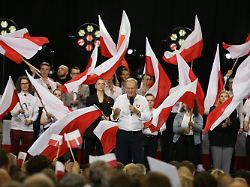Decision about course in EU
There is a lot at stake for Berlin in the Polish election
October 13, 2023, 5:04 p.m
When people vote in Poland on Sunday, it’s not just about politics in their own country. The vote on the new parliament is also likely to point the way for Germany, the EU and Ukraine. It’s about democracy and the rule of law, experts warn.
Fears in Berlin, Brussels and Kiev: Sunday’s parliamentary elections in Poland will decide whether the country will move closer to Germany and the EU again or whether Warsaw will continue on its course of confrontation. There is also a lot at stake for Ukraine. So far, Kiev has been able to rely on the support of its neighboring country – but recently the Polish government has distanced itself from Kiev.
The right-wing nationalist ruling party PiS recently led the election polls with 32 to 34 percent, but it will probably have to rely on a coalition partner if it wins the election. There is speculation about an alliance with the right-wing extremist Confederation Party, which is calling for an end to aid for Ukraine.
Meanwhile, the pro-European opposition leader Donald Tusk has set his sights on ousting the PiS, led by his arch-enemy Jaroslaw Kaczynski, from power after eight years. The former head of government’s opposition citizens’ coalition is a few percentage points behind the PiS in the polls, but has recently made gains and hopes to be able to forge a three-way alliance with the Third Way and the Left after the election. Two weeks before the election, the opposition was able to mobilize around a million people to demonstrate against the government.
“Most important election since 1989”
In the middle of the final stretch of the election campaign, news broke that two high-ranking military officials were resigning. The chief of general staff and the head of the operational command resigned from their positions on Tuesday. While no reasons were officially given, Polish media reported a deep conflict between the two military chiefs and Defense Minister Mariusz Blaszczak. Among other things, they resisted attempts to involve the army in the election campaign. The opposition New Left called for the minister’s resignation.
The election “is extremely hard-fought and balanced,” University of Sussex politics professor Aleks Szczerbiak wrote in a recent blog. For many, “this is the most important election since 1989,” said political professor Dorota Dakowska, who teaches at the Sciences Po University in Aix-en-Provence, to the AFP news agency. At stake is the “future of Poland as a democracy and a constitutional state.”
During the election campaign, the opposition tried to score points by, among other things, criticizing the government’s economic policy. Inflation in Poland remains relatively high and, according to EU forecasts, will be 11.4 percent in 2023, while economic growth will be weak at 0.5 percent.
PiS accusations against Tusk
The PiS focused on national security and relied on personal attacks against Tusk. PiS leader Kaczynski called Tusk the “personification of evil.” The OSCE noted a “strongly polarized” electoral environment in Poland. Many people have noticed “a clear bias in favor of the ruling party and its policies in the public media.”
The PiS government has been waging a power struggle with Brussels for years over its judicial reform, which critics condemn as an attack on the rule of law and democracy. Warsaw is also at odds with Brussels when it comes to refugee policy. Relations with Germany have also been tense for years. The PiS stoked anti-German sentiment during the election campaign and accused Tusk of being a puppet of Berlin.
Many Poles are tired of war
Meanwhile, Ukraine and its Western allies are concerned about whether Poland remains a key country supporting Kiev in its war against Russia. Warsaw has so far been an important ally of Kiev. Poland has taken in more than a million refugees and provided military aid to Kiev. It is also an important transit country for deliveries to Ukraine.
In the midst of the election campaign, however, the dispute between Warsaw and Kiev over Ukrainian grain exports escalated. Poland then threatened to restrict arms supplies to Ukraine. Poland’s President Andrzej Duda compared Ukraine to a “drowning man” who could drag his rescuers into the water. Such statements are likely aimed at winning the votes of nationalist voters, but they also reflect the “war weariness” of many Poles.
A recent poll showed that around 40 percent of Poles opposed expanding regulations allowing Ukrainians access to the labor market and social benefits. The editor-in-chief of the newspaper “Rzeczpospolita”, Boguslaw Chrabota, described the recent diplomatic tensions with Ukraine as “short-sighted”. However, it is a “purely electoral move” whose effects are only “temporary”.
